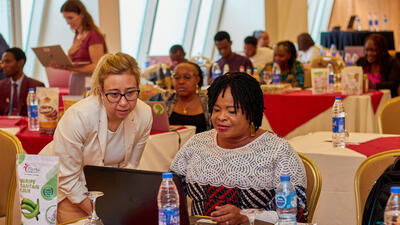RESULT-BASED MANAGEMENT FOR STRATEGIC PLANNING
COMESA and ITC held a Result-based management (RBM) Training Workshop in Lusaka, Zambia, in November 2009 within the framework of the Programme for building African Capacity for Trade (PACT II). Participants included staff from the COMESA Secretariat, sectoral associations and institutions involved in the implementation of PACT II such as the Leather and Leather Products Institute (LLPI), the COMESA Business Council (CBC), and the Eastern and Southern Africa Leather Industries Association (ESALIA).
One of the key PACT II outcomes is to strengthen the COMESA Secretariat and regional Trade Support Institutions (TSIs) to take the lead in trade development and promotion in order to achieve the COMESA Vision to “be a fully integrated, internationally competitive regional economic community with high standards of living for all its people ready to merge into an African Economic Community”. Within this context, the purpose of the training was to expose participants to RBM by developing a result framework for COMESA programmes, and understanding and applying the Logical Framework Approach.
A total of 25 representatives of the COMESA region, including staff from the Secretariat as well as representatives from national and regional TSIs, gained practical knowledge and skills in RBM to manage and implement development programmes.
The knowledge and skills acquired have been applied by the region and its Member States for designing the COMESA Medium Term Strategic Plan (MTSP) 2011-2015.
COMESA’s key challenges were to adhere to the road map for the finalization of the new MTSP according to RBM principles and to enhance the integration of its Policy Organs’ decisions into national development plans, budgets and reporting processes.
COMESA has therefore, for the first time in its history, developed its MTSP together with the beneficiaries of its programmes, that is to say the Member States, during National Consultative Workshops held in various countries between May and June 2010, with the technical support of the PACT II programme and financial support of the World Bank.
These national consultations have contributed to improve communication flows between the COMESA Secretariat and Member States, while strengthening the Secretariat’s visibility and lead role within the region.
Not only the Medium Term Strategic Plan is fully based on RBM, but it also captures Member States’ strategic plans. Further, the results of the workshops serve as useful inputs in the annual planning and programming to ensure that COMESA’s Council Decisions and programmes are aligned with priorities of the Member States. This contributes to the effective and efficient implementation of COMESA programmes at both regional and national levels.
In 2010, a total of 48 African experts from TSIs and staff of Regional Economic Communities were trained in RBM to manage and implement their trade-related development programmes.















